
views
X
Trustworthy Source
American College of Allergy, Asthma, and Immunology
National professional organization of allergists, asthma specialists and immunologists that focuses on supporting and publishing research
Go to source
Allergists usually recommend medication and shots for severe allergies, but you might want to avoid medications for now. Fortunately, there are some natural ways to treat your allergies, as well as strategies to avoid allergens altogether. Try these out for yourself and see if they work for you. If not, then visit an allergist for additional treatment options.
Trying Herbal Treatments

Eat quercetin to block histamines. Quercetin is a natural antihistamine that could relieve allergy symptoms. You can get it from foods or dietary supplements, so try including these in your diet and see if your allergies improve. Some foods high in quercetin are onions, apples, broccoli, leafy green vegetables, berries, grapes, and wine.
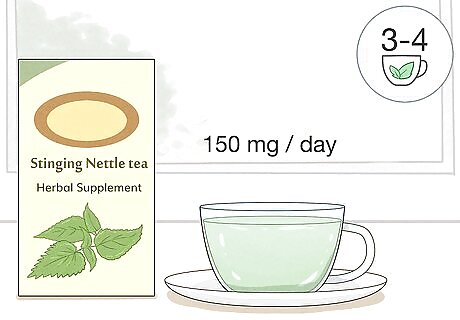
Try stinging nettle tea to relieve your symptoms. Stinging nettle shows some success as an antihistamine. It’s available as an herbal tea mixture, so try having 3-4 cups per day to see if it helps relieve your allergy symptoms. Stinging nettle is safe in amounts up to 150 mg per day. Never eat stinging nettle raw. It can cause burning and irritation if it isn’t processed.
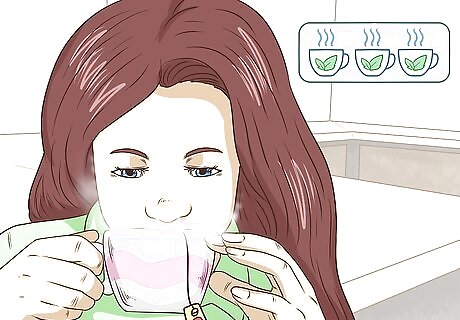
Boost your antioxidant levels with green tea. Antioxidants can help your body resist allergies, and green tea is an excellent source of these nutrients. Sipping 2-3 cups per day when you feel your symptoms acting up could relieve your symptoms. Green tea doesn’t appear to be as effective if your allergies have gotten bad. It works best right at the start of your symptoms.

Reduce inflammation with turmeric. Turmeric contains curcumin, a natural anti-inflammatory compound. This could reduce the swelling in your nasal passages and airway when your allergies are acting up. Try adding some of this spice to your daily diet and see if it works for you. Turmeric is safe in relatively high doses, even over 2,500 mg, so you should be able to add it to your diet without any side effects.

Support your immune system with vitamin C and omega-3s. A stronger immune system could help you fight off allergies. Vitamin C and omega-3s are a big part of boosting your body’s immune response. Include plenty of each nutrient in your diet to see if this helps treat your allergies. Try to get 65-90 mg of vitamin C each day. Good sources include bell peppers, leafy green vegetables, citrus fruits, and apples. Try to get 1-1.6 g of omega-3s per day from your regular diet for the best results. Good sources include oily fish, nuts, seeds, and avocados. Omega-3s can also reduce inflammation.
Clearing Your Sinuses

Cleanse your nasal passages with a neti pot. A neti pot is a simple device for rinsing your sinuses. Fill the pot with saline solution and tilt your head to the side over a sink. Pour the saline into your top nostril and let it flow out of your bottom one. Repeat this once a day while your allergy symptoms last. Only use sterile saline solution in a neti pot. Never use tap water. This will feel weird at first. Try to breathe through your mouth as well as you can.
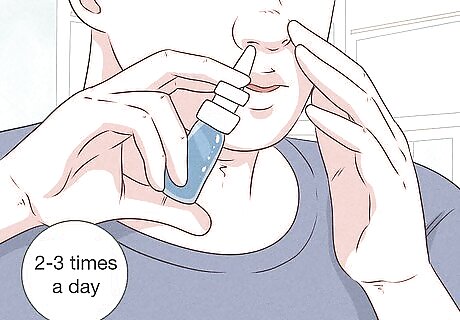
Rinse with a saline spray bottle for a simpler solution. Nasal saline sprays work on the same principle as a neti pot, but they’re a bit easier to use. Spray the solution up your nose and let it drip out to clean your nasal passages. You can usually do a saline rinse 2-3 times per day, but check the instructions on the product you use.
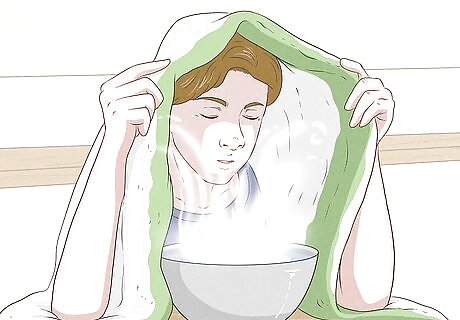
Inhale steam to draw out mucous. If you're very congested, then a steam treatment can draw out some of that mucous. Fill a pot with water and heat it over a flame until it's steaming. Lean over the pot and inhale the steam to loosen your mucous. You could also inhale the steam while you're taking a bath or shower for a similar effect.
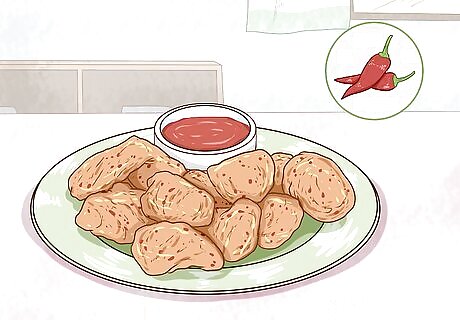
Try eating cayenne pepper to open your sinuses. Cayenne can naturally thin mucous and reduce inflammation in your airway. Try adding some to your food to help yourself breathe easier if your allergies are acting up. There’s no universal dose for cayenne. Try adding it 1/2 tsp (2.5 g) at a time until you find a flavor that you like. Cayenne can trigger heartburn, so avoid it if you have GERD or often experience heartburn.
Avoiding Outdoor Allergens

Stay inside on days when allergens are high. Allergens like pollen, ragweed, and mold are higher on some days than others, especially in the spring. Check your local news station to monitor the allergen levels in your area. On days when allergens are high, it’s best to stay inside as much as possible. You could also use a weather app to track local allergen levels. Keep your windows closed on high-allergen days so they don’t get inside your home. A bit of rain usually decreases allergen levels. However, heavy rainfall could kick up more pollen, so be careful going out side after strong rainstorms.
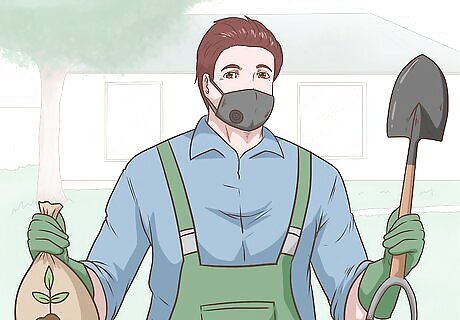
Wear a dust mask if you do outdoor tasks. Gardening, mowing the lawn, cleaning your garage, and any other outside tasks kick up a lot of dust and allergens. Avoid breathing these in by wearing a dust mask during any outdoor chores. If you’re very sensitive, then you might want to wear a mask all the time when you go outside on high-allergen days.

Take a shower before bed to wash pollen and allergens off yourself. Whenever you go outside on high-allergen days, pollen can stick to your clothes and skin. If you go to sleep without washing them off, they’ll get on your bed and your allergies could get worse overnight. Take a shower before bed so no allergens irritate you while you sleep. This is especially important for kids that play outside during the day. If you’ve been working outside, then it’s best to shower right away to.

Dry your laundry inside. While air-drying your laundry is good for the environment, it also lets allergens settle on your clothes and linens. Either use your dryer or set up an indoor drying rack to protect your laundry from allergens.
Keeping Allergens Out of Your Home
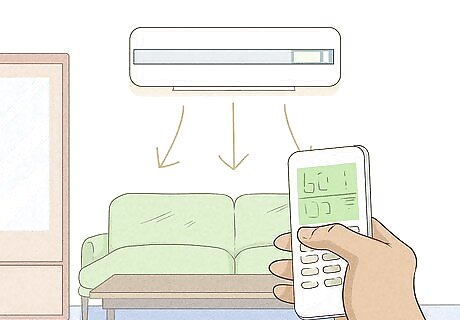
Run your air conditioning to keep your home cool and dry. Damp, hot conditions are perfect for mold spores to grow in. When it’s humid and warm outside, run your air conditioning to prevent mold allergens from growing. Running the AC also keeps allergens out of your home in the spring and summer. Always check your AC filter once a month to make sure it's clean. If it’s dirty, it could pump irritants into your home. Clean or replace it when it's dirty.
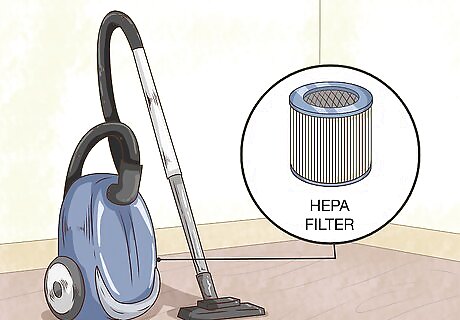
Clean your home with a HEPA vacuum cleaner. A HEPA (high-efficiency particulate air) filter is designed to pick up dust and other allergens better than a standard vacuum cleaner. Use a HEPA vacuum on all your floors and rugs to remove as many allergens as possible. It’s best to clean at least once a week so allergens don’t build up in your home. Open the windows while you’re working so dust filters out.
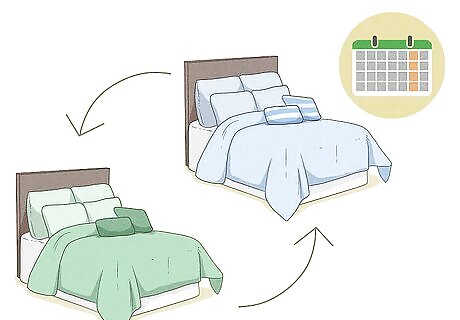
Wash your bedding at least once a week. Even if you shower regularly and keep your home clean, it’s inevitable that some dust and irritants will get on your bed. Wash the sheets, pillowcases, and blankets once a week to remove any allergens. If your allergies are bed, you could get a protective cover for your mattress to prevent it from absorbing allergens.
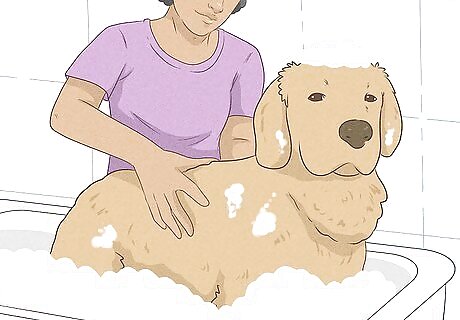
Bathe your pet at least once a week. Pet dander is another common cause for allergies. If you have a pet, give them a bath once a week to remove any allergens from their fur. It’s also a good idea to brush them off before they come inside if they’ve been outside rolling around in the grass. This keeps allergens outside.
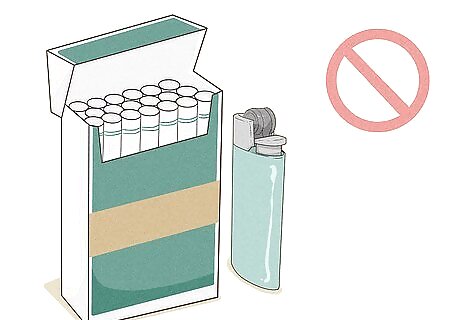
Keep cigarette smoke out of your home. Cigarette smoke is irritating and often triggers allergy or asthma symptoms. If you smoke, make sure you do it outside to prevent irritants from building in your home. Don’t let any of your guests smoke inside either. If you smoke, it’s best to quit as soon as possible. Smoking not only makes you more susceptible to allergies and asthma, but could cause many other health issues.
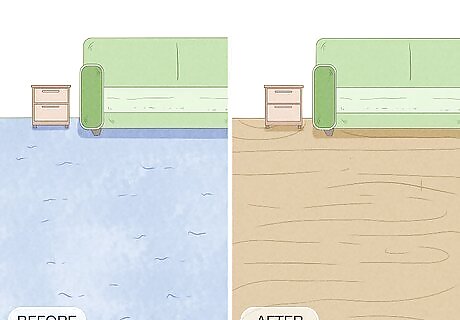
Remove carpeting to prevent dust and dander from building up. Indoor carpeting attracts a lot of allergens, especially dust and pet dander. If you have any wall-to-wall carpeting, try replacing it with solid flooring. This can improve your allergy symptoms and is also helpful if you have asthma. If you want some carpeting, choose area rugs instead. Hardwood floors are also much easier to clean, so you can remove any allergens before they cause problems.


















Comments
0 comment